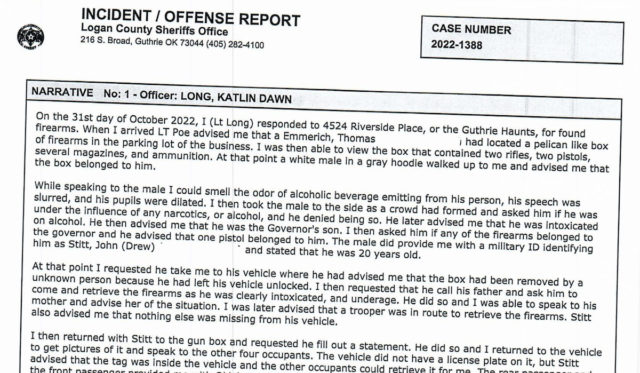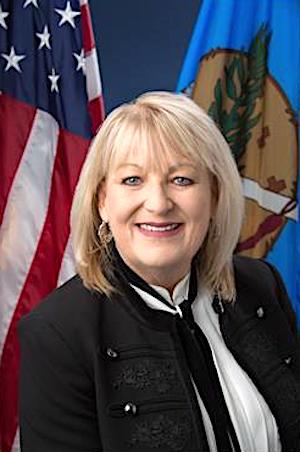

John Andrew Stitt, the 20-year-old son of Oklahoma Gov. Kevin Stitt, and three other minors caught in possession of alcohol have been sent a letter by the Logan County District Attorney’s Office offering participation in a deferred prosecution program that involves community service, fee payment and potential revocation if terms of the program are not met or if participants violate the law again during the program period.
A drug and alcohol risk assessment could also be ordered through the program, which has existed for about three years and is aimed at diverting first-time offenders from the criminal justice system.
If Drew Stitt — who told a Logan County deputy sheriff that cases of alcoholic beverages and a box of firearms were his Oct. 31 outside of a Guthrie haunted house — declines to participate in the deferred prosecution program, he will be charged with a criminal misdemeanor of minor in possession of alcohol, according to District Attorney Laura Austin Thomas.
“We have what’s called a deferred prosecution program in both Stillwater and in Guthrie where we offer people on certain offenses — of which minor in possession is one — who have absolutely no priors the ability to enter into the deferred prosecution and community service and whatever my executive director of rehab services thinks is appropriate for that person,” Thomas said. “If they complete the deferred prosecution, then charges would not be filed.”
Thomas, who serves as district attorney for Payne and Logan counties, said about 170 people are currently completing the deferred prosecution program.
“Particularly in Stillwater (where Oklahoma State University is located), you get minor in possession a lot, and we don’t want everyone to have a criminal record, because even misdemeanors mean a lot to some people now trying to get a job. That’s the purpose of a deferred prosecution,” Thomas said. “I want you to know [Drew Stitt] was not treated differently in the slightest. That’s my worry — that people will think that.”
Logan County Sheriff Damon Devereaux told Ben Felder of The Oklahoman that he also believed no special treatment had been provided to Drew Stitt or his friends.
“People are talking about this being swept under the rug, but we did a fully detailed report that day and submitted an affidavit to the district attorney’s office for charges,” Devereaux told The Oklahoman. “Why they haven’t filed anything is beyond me.”
Thomas explained the deferred prosecution process to NonDoc on Monday morning, and she said news articles over the weekend that outlined the Oct. 31 incident resulted in many people thinking the governor’s son received preferential treatment from sheriff’s deputies and her office because the articles said no charges had been filed.
“What they said was true. No charges have been filed, because we sent the letter. But it’s not an accurate representation of what our office does and intends to do in this case,” Thomas said. “I knew right away when I was advised of this situation that, if they had no priors, it was going to be a [deferred prosecution] situation.”
Thomas said she was frustrated by the weekend’s news reports, because they lacked information about how her office was handling the cases.
“No press contacted me, and at least one reporter from every place has my cell phone number,” she said. “I was waiting for that one day. I figured one day they’d pick it up.”
Thomas: ‘I’ve had no contact with the governor’
Whether Drew Stitt or the other three underage individuals caught with alcohol will agree to Thomas’ deferred prosecution program is unclear. Gov. Kevin Stitt’s press secretary declined to comment on the situation Monday.
Thomas, meanwhile, said most people agree to participate in an effort to keep cases off their permanent records and to save money.

“It’s just a more common sense way of us doing stuff. We don’t really advertise this program,” she said. “I’m aware of all the negativity that thinks DAs don’t do anything [to divert people from the criminal justice system], but we do. We just don’t go toot our horn, but I am quite happy with this program.”
Thomas outlined how the deferred prosecution program works. Offenders who qualify — meaning they have no prior adjudications with the criminal justice system — are sent a letter offering two dates for a meeting with the District Attorney’s Office. If the offender declines to attend the meeting, they are charged with the applicable criminal violation and are prosecuted.
If the offender agrees to participate in the deferred prosecution program, they meet with a “rehab services” employee in the District Attorney’s Office. According to Thomas, that employee “figures out if they need a drug and alcohol assessment or whether it was just a really bad judgement call.”
“They all end up doing some sort of community services that [we pick] because they live in different places,” Thomas said. “The cost for a deferred prosecution is less than the court cost for a court-filed case. So when we designed this program, that is what we wanted it to be — a less expensive way to handle everything.”
Thomas said deferred prosecution agreements typically last either six or 12 months. Depending upon the case at hand, some can be as short as 90 days.
“Some people have failed the program before, and we have terminated them from the program and filed charges,” Thomas said. “We make this as easy as we can if they want to accept this. So that’s why when somebody doesn’t accept it, it’s pretty shocking, really.”
Thomas said the letters for Stitt and the other three offenders were mailed recently, so she said she was unsure whether they had even received them yet.
“I’ve had no contact with the governor. I don’t talk to the governor about this or anything,” said Thomas, who has previously clashed with the Stitt administration regarding his appointees to the Oklahoma Pardon and Parole Board.
Guns, trooper escort raise eyebrows
Thomas said she reviewed the report from the Logan County Sheriff’s Office personally and that her office checked to make sure none of the implicated individuals had a prior criminal record.
“Obviously, the concern with us in this particular case was the presence of guns,” Thomas said. “(It was) a horrible judgment call to leave guns in the back bed of your pick up truck. However, [John Stitt] immediately claims them when they are sitting out in the parking lot and here come the police. So there’s no indication that guns were loaded, that guns were used. The guns were not taken because they weren’t related to any crime.”
Thomas said Stitt and the others would not have been eligible for the deferred prosecution program if the guns had been brandished or fired that evening.
“That would be a very different deal from this,” she said.
According to the sheriff’s office report (embedded below), Deputy Katlin Long responded to a call regarding “found firearms,” which were located in a box outside of a truck owned by Drew Stitt. An OSU student who joined the Oklahoma Army National Guard in 2020, Stitt approached Long and said the box of guns — containing two rifles, two pistols and ammunition — was his and that it may have been removed from his truck, which may have been left unlocked by accident. Long asked Drew Stitt if any of the firearms were his father’s, and he said one pistol belonged to the governor.
Long wrote that Stitt initially denied being intoxicated but later admitted it.
“I then requested that he call his father and ask him to come and retrieve the firearms as he was clearly intoxicated, and underage,” Long wrote. “He did so and I was able to speak to his mother and advise her of the situation. I was later advised that a trooper was in route to retrieve the firearms.”
While searching the truck, Long found cases of Natural Light Naturday and Twisted Tea, as well as an additional rifle. Another individual in the parking lot reported that his vehicle had been hit by an empty Twisted Tea can. Long seized all of the alcohol.
“I then placed the rifle into the gun box with the other firearms, and awaited the arrival of OHP,” Long wrote. “OHP Trooper Symes 789 arrived on scene a short time later and I turned over the box of firearms to him. He then placed them into the bed of Stitt’s truck which [an underage woman] was driving as she did not appear intoxicated, and advised that he would be following them back to Stillwater, OK and securing the firearms.”
Thomas said the description of events outlined in Long’s report support her decision to offer the deferred prosecution program.
“They had no problems with any of these kids,” Thomas said. “It’s not an aggravated situation like some minor in possessions are. They were respectful.”
NonDoc asked Sarah Stewart, public information officer for the Department of Public Safety, about the appropriateness of having a highway patrolman escort Drew Stitt home with the firearms following the incident. She said the agency did not have a comment on the matter.
Under Title 47, Section 2-101 of state statute, “The commissioner of public safety shall provide personal security and protection, transportation, and communications capabilities for the governor, the governor’s immediate family, and the lieutenant governor.”
Read the law enforcement report
